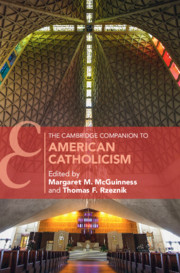Book contents
- The Cambridge Companion to American Catholicism
- Cambridge Companions to Religion
- The Cambridge Companion to American Catholicism
- Copyright page
- Contents
- Contributors
- Introduction
- Part I Historical Overview
- 1 American Catholicism’s Early Foundations
- 2 The Immigrant Church, 1820–1908
- 3 The Catholic Century
- Part II Catholic Life and Culture
- Part III The Many Faces of Catholicism
- Part IV Conclusion
- Index
- Series page
- References
1 - American Catholicism’s Early Foundations
from Part I - Historical Overview
Published online by Cambridge University Press: 27 May 2021
- The Cambridge Companion to American Catholicism
- Cambridge Companions to Religion
- The Cambridge Companion to American Catholicism
- Copyright page
- Contents
- Contributors
- Introduction
- Part I Historical Overview
- 1 American Catholicism’s Early Foundations
- 2 The Immigrant Church, 1820–1908
- 3 The Catholic Century
- Part II Catholic Life and Culture
- Part III The Many Faces of Catholicism
- Part IV Conclusion
- Index
- Series page
- References
Summary
Catholics were in the United States from the very beginning. Some were the descendants of people who had migrated to Maryland, Pennsylvania, and New York in the seventeenth and eighteenth centuries – primarily from England, but to a lesser extent from Ireland, Germany, and Portugal. Others were the descendants of people who had migrated to Florida and Louisiana from Spain, France, and Quebec during those same centuries.
- Type
- Chapter
- Information
- The Cambridge Companion to American Catholicism , pp. 13 - 30Publisher: Cambridge University PressPrint publication year: 2021

